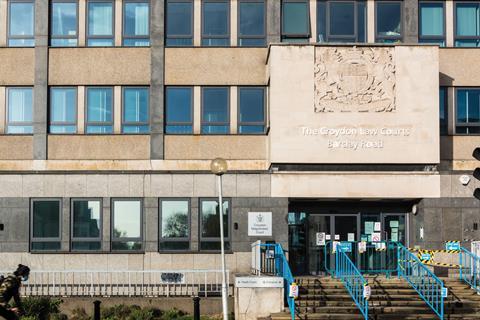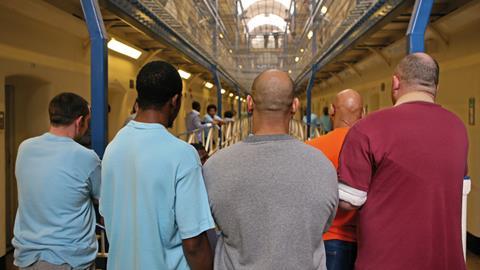A perma-crisis in the criminal justice system has led to a patchwork of mini-fixes, but the backlog of Crown court cases remains stubbornly high. Yet the delays have one significant upside for the government, reports Catherine Baksi
The low down
Hit by a double whammy of austerity and pandemic restrictions, the criminal justice system is ‘on its knees’. Inadequate fees have forced many solicitors and barristers to give up criminal legal aid, and there is a shortage of judges. The backlog of cases in Crown and magistrates’ courts in England and Wales remains high. Defendants and victims are left in limbo for years waiting for trials to come to court in a justice system that has been struggling due to underfunding. The problems are causing destructive stress among those lawyers who remain. Some lawyers have questioned the government’s commitment to bringing the backlog of cases down. After all, tackling the backlog would increase the prison population – and prisons are at capacity.
The government aims to reduce the backlog of Crown court cases in England and Wales to 53,000 by March 2025. But it is not on schedule to meet this target. Despite increased funding and a raft of corrective measures, including upping judges’ sitting days, extending the use of temporary Nightingale courts, recruiting judges, raising the judicial retirement age from 70 to 75 and enabling more remote hearings, the figure remains stubbornly high – at 62,235.
This has prompted critics to suggest that ministers are not serious about reducing the backlog. Faced with the conflicting priorities of cutting delays in the courts and preventing unmanageable and dangerous overcrowding in prisons, they suggest that the latter takes priority.
Prisons are full
Chris Daw KC, a criminal barrister at Lincoln House Chambers in Manchester, says: ‘It’s absolutely impossible for the government to seriously increase the throughput of cases in the court system, because it couldn’t cope with the consequent massive and unsustainable overcrowding in the prison estate.’
If every case currently in the system was processed in six months, he estimates that the government would require a minimum of 50% more prison places.
Daw suggests that the government’s preferred strategy is to ‘allow the backlog to get longer and use the court system as a brake on the prison population’. Principles of efficiency and timeliness, he says, have been sacrificed in favour of ‘rationing the throughput of the system due to under-resourcing’.
Advocating a temporary increase in the availability and use of suspended sentences, Nick Vineall KC, chairman of the Bar Council, says: ‘At the moment the prisons are so full that I think the government is nervous about seeing the Crown court backlog reduced, because getting cases through the system faster will mean more prison sentences.’
To support their argument, these lawyers point to the reversal of the controversial policy to double the maximum sentencing powers of magistrates from six to 12 months’ imprisonment. The government introduced the measure in May 2022, heralding it as ‘the latest step to tackle the impact of the pandemic on the criminal justice system’.
By allowing more cases to be dealt with in the magistrates’ courts, ministers said that it would free up around 1,700 extra days of Crown court time each year, to enable judges to focus on ‘getting through more serious, complicated cases’.
'The prisons are so full that I think the government is nervous about seeing the Crown court backlog reduced, because getting cases through the system faster will mean more prison sentences'
Nick Vineall KC, Bar Council
Less than a year later, as the prison estate edged towards capacity, ministers suspended the change, returning the sentencing powers of magistrates to six months – much to the chagrin of the Magistrates’ Association, which had lobbied for the increased powers for years.
The increased powers resulted in a 35% increase in sentences between six months and 12 months, amounting to 500 prisoners, according to figures given to the House of Lords by justice minister Lord Bellamy in May.
Lord Thomas of Gresford KC (Martin Thomas), a member of the House of Lords constitution committee, said that Bellamy indicated that the ‘new structure was posing risks to the prison system’s ability to deal with the change in flow’, so the government ‘decided they had to do everything possible to avoid running out of prison capacity, albeit at the expense of some increased pressure on the Crown court’.
Likewise, giving evidence to the committee last month, lord chief justice Lord Burnett of Maldon said that the decision to reverse the power ‘was simply to slow down some cases going through the system’, because ‘if the case goes to the Crown court it takes longer’.
The policy reversal, he said, was ‘buying a little bit of time in the spring’, adding that he hoped the suspension was temporary.

Adding up
Pre-Covid, delays were already mounting in the Crown courts, partly due to the government’s cost-saving measure of reducing the number of days that judges sat.
The latest statistics, published by the Ministry of Justice in June, reveal that in the three months to the end of March 2023, the backlog of Crown court cases fell by just 276 (0.4%) to 62,235 – 29,353 cases more than the record low achieved just four years earlier of 32,882.
Analysis by the Criminal Bar Association (CBA) shows that the backlog of rape cases during the first quarter of 2023 hit a new record of 2,210 – up 289% in four years.
In February, public policy thinktank the Institute for Government suggested that the government would miss its target of reducing the Crown court backlog to 53,000.
Lord Burnett told peers that, as at December 2022, 49% of cases in the Crown court had been outstanding for less than six months, 22% for between six and 12 months, and 29% for more than 12 months.
The latest data published by the MoJ revealed that from January to March 2023, the median time from offence to completion at the Crown court increased by 8% on the previous quarter (from 370 to 398 days) – well above the pre-Covid levels (254 days in the first quarter of 2020).
As a result of the delayed trials, an analysis by the CBA of the ministry’s offender management statistics also shows that, as at 31 March 2023, the number of people remanded in custody awaiting trial or sentence reached a 20-year high of 14,591.
‘Eyes and ears’: the courtwatch programme
All criminal cases begin in the magistrates’ courts and the vast majority are dealt with there too. Most people will never encounter the criminal justice system and most are unaware that they can go inside to observe courts business.
With fewer journalists covering local courts, what happens in magistrates’ courts is seldom seen or reported, and poor practice or miscarriages of justice can go unnoticed.
This summer, the charity and campaign group Transform Justice is seeking to change this. Inspired by successful projects in America and other countries, it is piloting CourtWatch – a mass court observation programme, where members of the public observe the daily hearings in court and report what they see.
In three magistrates’ courts in London, volunteers will collect real-time data on what happens in court, becoming the eyes and ears of accountability in the courtroom.

Fionnuala Ratcliffe, Transform Justice’s research and policy lead, explains that court-watching is the practice of observing and documenting what really happens in the courtroom. ‘By attending court hearings and writing down what they see, volunteer courtwatchers become the eyes and ears of the community. The data they gather helps to hold courts accountable, identify bad practice, and take action to change it,’ she says.
Observers will collect information on matters including: how many people have legal representation; the proportion of defendants from minority communities; and how young adults are treated.
They will record who appears via video-link, how well the process works and how long cases take, as well as noting their impressions of the court process.
‘With better data, we can make a stronger case for change,’ says Ratcliffe. ‘We also want to test whether the principles of open justice are alive and well or withering on the vine.’
Prisoner
The Gazette has learned of one case where the defendant, 57, has been in prison for three years and eight months since being charged with conspiracy to import class A and B drugs in October 2019 (offences that he denies). His arrest triggered a recall to prison in relation to a separate arrest, but his solicitor, Mark Jones at MJP Solicitors in Liverpool, says that the custody time limit (CTL) – the statutory maximum time that someone can be detained awaiting trial – has been extended six times.
Jones’s client was refused permission for a judicial review of the most recent decision to extend his CTL on a paper application, but has appealed and Jones is seeking an oral hearing. He tells the Gazette: ‘CTLs are intended to protect people in custody. [They were] not intended as a means to legalise the lengthy detention of accused people without trial. You can’t use a law intended to get people released to keep them in custody.’
His client’s case is scheduled for trial in December 2023. The Crown Prosecution Service, Jones adds, applied to empanel a jury last month in order to stop the CTL clock – but the judge refused.
The defendant’s son says that due to staff shortages in prison, the defendant is frequently locked in his cell for 23 or 24 hours a day, adding that the conditions are seriously affecting his mental health. He questions how his father and others in a similar situation are expected to be in a fit state to give evidence when their trials eventually take place.
A CPS spokesperson told the Gazette: ‘We have acted entirely properly in the remand of this defendant. It is inaccurate to suggest we sought to swear a jury in this defendant’s trial with the intention to stop the custody time limit clock. At all stages we have applied for the trial to be listed at the earliest possible date. The defendant has been denied bail by the court and has been unsuccessful in an application to judicially review the court’s decision.’
Thinktank the Criminal Justice Alliance is particularly concerned about the growing use of remand for women and girls, especially as most do not go on to receive custodial sentences. Director Nina Champion supports government plans for court-based bail advice, to provide support packages to keep people out of custody before trial. Last year, the government announced a pilot focused on women and ethnic minority groups in magistrates’ courts in Ipswich and Cardiff.
Champion is nevertheless concerned that the pilot areas are not racially diverse, and questions whether the agencies required to make the initiative work will get adequate funding. She is also concerned about the government’s plans to provide the national service remotely.
And then there is a knock-on effect for civil cases. Harriet Salvesen-Sawh, a personal injury solicitor at law firm Fieldfisher, highlights the impact that Crown court delays are having on civil claims for compensation made by those seriously injured in road traffic incidents.
Where criminal cases are delayed, she explains, injured parties cannot get the necessary police evidence to prove liability for the civil claim, which also has to be deferred, with consequent emotional and physical impact on the client.
Judicial struggles
In his final appearance before the Lords constitution committee before he retires in September, Lord Burnett was frank about the government’s underfunding of the criminal justice system, and the consequent shortages of criminal defence solicitors, barristers and judges. One of the ‘struggles’ he has had as lord chief justice has been ‘to raise the eyes of the Treasury above the immediate balance sheet … of money into the system, and what is delivered and what can be saved’.
Burnett attributed the continued problem of a shortage of prosecution and defence advocates in some parts of the country to ‘a long-term undermining and attrition of the criminal legal profession’, which he said ‘is going to take time to repair’.
He voiced concern over the declining number of criminal legal aid solicitors providing advice in police stations, which he said was also due to the ‘failure to increase fees over time’.
As the government drags its feet over fully implementing the recommendations of the criminal legal aid review that it commissioned, Burnett said he was ‘concerned and not entirely optimistic that the criminal legal profession, both sides, will recover quickly enough to be able to do the work that needs to be done’.
The report published in November 2021 by Lord Bellamy recommended an immediate 15% increase across the board for solicitors and barristers as a ‘first step in nursing the system of criminal legal aid back to health after years of neglect’.
Barristers went on strike before Brandon Lewis, in a brief spell as lord chancellor, agreed to give them the recommended fee rise. But the government faces a legal challenge from the Law Society to its ‘irrational’ refusal to follow Bellamy’s recommendation in relation to solicitors’ fees.
On 22 June, the High Court granted permission to the Society to bring its judicial review challenge against the government. President Lubna Shuja urged Alex Chalk, the new lord chancellor, to reconsider his predecessor’s refusal to engage in some form of alternative dispute resolution and address member concerns without going to court.
The ruling came two days after the Society warned that the ‘widescale collapse’ of the duty solicitor scheme – which provides advice to arrested defendants in police custody – is forcing police to release suspects because interviews are unable to progress without legal representation.
Law Society data predicts that in the decade from 2017, the duty solicitor rotas will see a 37% fall in numbers due to inadequate remuneration. The numbers, it says, have plummeted by more than 1,400 (26%) since 2017 and Chancery Lane estimates that a further 618 (11%) could be lost by 2027.

A system ‘on its knees’
The justice system, says Fadi Daoud, president of the London Criminal Courts Solicitors’ Association, is on its knees. ‘It’s a perfect storm of irreconcilable forces,’ he says. ‘A massive police officer recruitment drive has sparked a spike in arrests; a dearth of defence solicitors and barristers, and a growing number of DIY defendants; Crown court delays reaching into 2025 and beyond. To cap it all, prisons are dangerously full.’ For those solicitors who continue to do criminal legal aid work, Daoud says, the stress is unimaginable. ‘We’re hanging on to a cliff edge, working seven days a week, finishing at 3am. That’s not a life, it’s an existence.
‘The impact on our health – physical and mental – and our families is not sustainable.’
Following a recommendation of the Bellamy Review, the government set up a Criminal Legal Aid Advisory Board. But nine months since it first met, as Burnett observed, ‘its chair has not yet been identified’.
In the magistrates’ courts, where most criminal cases are dealt with, the backlog at the end of March 2023 was 340,126 – down 1% on the previous quarter (342,505) and a 19% fall from the peak of 422,156 in 2020. The number of magistrates has fallen by half from over 25,000 in 2012, to just over 12,600. An advertising campaign to increase their number attracted over 60,000 ‘expressions of interest’.
To address the outstanding cases, a spokeswoman for the Magistrates’ Association estimates that 17,000 magistrates are needed. She calls on officials to work to turn those expressions of interest into ‘actual magistrates as soon as possible’.
Justice minister Mike Freer told MPs in June that the government ‘remains committed’ to reducing the outstanding caseload.
An MoJ spokesman tells the Gazette: ‘Now that courts are back at full capacity, measures including lifting the cap on the number of days courts can sit and recruiting more judges will help restore the swifter access to justice victims deserve.’ The ministry is also ‘delivering the biggest expansion of prison places in over a century’, to create an additional 20,000 places.
Criminal law practitioners can only hope that increased prison capacity will change what currently presents as a perverse incentive to keep the backlog of cases high.
Catherine Baksi is a freelance journalist
































4 Readers' comments